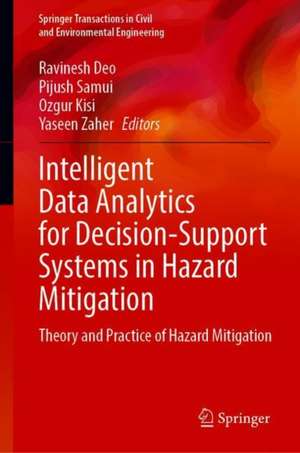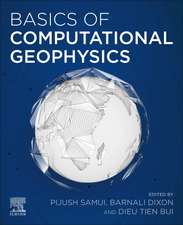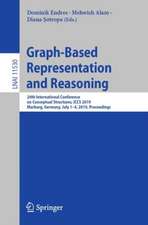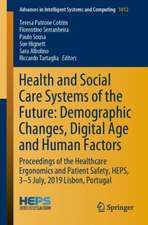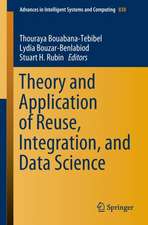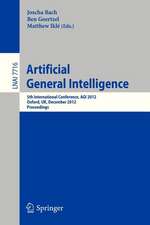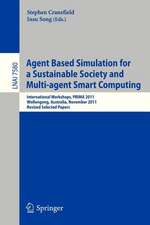Intelligent Data Analytics for Decision-Support Systems in Hazard Mitigation: Theory and Practice of Hazard Mitigation: Springer Transactions in Civil and Environmental Engineering
Editat de Ravinesh C. Deo, Pijush Samui, Ozgur Kisi, Zaher Mundher Yaseenen Limba Engleză Hardback – 30 iul 2020
| Toate formatele și edițiile | Preț | Express |
|---|---|---|
| Paperback (1) | 1167.33 lei 6-8 săpt. | |
| Springer Nature Singapore – 31 iul 2021 | 1167.33 lei 6-8 săpt. | |
| Hardback (1) | 1173.93 lei 6-8 săpt. | |
| Springer Nature Singapore – 30 iul 2020 | 1173.93 lei 6-8 săpt. |
Din seria Springer Transactions in Civil and Environmental Engineering
- 18%
 Preț: 778.45 lei
Preț: 778.45 lei - 15%
 Preț: 643.34 lei
Preț: 643.34 lei - 15%
 Preț: 647.40 lei
Preț: 647.40 lei - 18%
 Preț: 894.46 lei
Preț: 894.46 lei - 18%
 Preț: 902.36 lei
Preț: 902.36 lei - 18%
 Preț: 1008.12 lei
Preț: 1008.12 lei - 15%
 Preț: 606.04 lei
Preț: 606.04 lei - 18%
 Preț: 1126.52 lei
Preț: 1126.52 lei - 18%
 Preț: 956.03 lei
Preț: 956.03 lei - 15%
 Preț: 652.31 lei
Preț: 652.31 lei - 15%
 Preț: 654.95 lei
Preț: 654.95 lei - 15%
 Preț: 638.24 lei
Preț: 638.24 lei - 18%
 Preț: 1228.29 lei
Preț: 1228.29 lei - 24%
 Preț: 795.60 lei
Preț: 795.60 lei - 15%
 Preț: 652.64 lei
Preț: 652.64 lei - 24%
 Preț: 811.32 lei
Preț: 811.32 lei - 18%
 Preț: 953.52 lei
Preț: 953.52 lei - 20%
 Preț: 547.79 lei
Preț: 547.79 lei - 24%
 Preț: 810.22 lei
Preț: 810.22 lei - 18%
 Preț: 954.93 lei
Preț: 954.93 lei - 24%
 Preț: 943.29 lei
Preț: 943.29 lei - 18%
 Preț: 939.94 lei
Preț: 939.94 lei - 18%
 Preț: 1399.43 lei
Preț: 1399.43 lei - 18%
 Preț: 1108.36 lei
Preț: 1108.36 lei - 24%
 Preț: 790.41 lei
Preț: 790.41 lei - 18%
 Preț: 1389.15 lei
Preț: 1389.15 lei - 15%
 Preț: 642.83 lei
Preț: 642.83 lei -
 Preț: 387.58 lei
Preț: 387.58 lei - 18%
 Preț: 960.13 lei
Preț: 960.13 lei - 24%
 Preț: 966.43 lei
Preț: 966.43 lei - 15%
 Preț: 644.63 lei
Preț: 644.63 lei - 18%
 Preț: 890.85 lei
Preț: 890.85 lei - 15%
 Preț: 647.40 lei
Preț: 647.40 lei - 20%
 Preț: 551.31 lei
Preț: 551.31 lei - 18%
 Preț: 1222.80 lei
Preț: 1222.80 lei - 24%
 Preț: 1049.20 lei
Preț: 1049.20 lei
Preț: 1173.93 lei
Preț vechi: 1467.42 lei
-20% Nou
Puncte Express: 1761
Preț estimativ în valută:
224.67€ • 232.77$ • 187.49£
224.67€ • 232.77$ • 187.49£
Carte tipărită la comandă
Livrare economică 22 martie-05 aprilie
Preluare comenzi: 021 569.72.76
Specificații
ISBN-13: 9789811557712
ISBN-10: 9811557713
Ilustrații: XX, 469 p. 225 illus., 205 illus. in color.
Dimensiuni: 155 x 235 mm
Greutate: 0.86 kg
Ediția:1st ed. 2021
Editura: Springer Nature Singapore
Colecția Springer
Seria Springer Transactions in Civil and Environmental Engineering
Locul publicării:Singapore, Singapore
ISBN-10: 9811557713
Ilustrații: XX, 469 p. 225 illus., 205 illus. in color.
Dimensiuni: 155 x 235 mm
Greutate: 0.86 kg
Ediția:1st ed. 2021
Editura: Springer Nature Singapore
Colecția Springer
Seria Springer Transactions in Civil and Environmental Engineering
Locul publicării:Singapore, Singapore
Cuprins
Chapter 1: Drought Index Prediction using Data Intelligent Analytic Models: A Review.- Chapter 2: Bayesian Markov Chain Monte Carlo based copulas: Factoring the Role of Large-scale Climate Indices in Monthly Flood Prediction.- Chapter 3: Gaussian Naive Bayes Classification Algorithm for Drought and Flood Risk Reduction.- Chapter 4: Hydrological Drought Investigation using Streamflow Drought Index.- Chapter 5: Intelligent Data Analytics Approaches for Predicting Dissolved Oxygen Concentration in River: Extremely Randomized Tree Vs Random Forest, MLPNN and MLR.- Chapter 6: Evolving Connectionist Systems versus Neuro-Fuzzy System for Estimating Total Dissolved Gas at Forebay and Tailwater of Dams Reservoirs.- Chapter 7: Modulation of Tropical Cyclone Genesis by Madden-Julian Oscillation in the Southern Hemisphere.- Chapter 8: Intelligent Data Analytics for Time-series, Trend Analysis and Drought Indices Comparison.- Chapter 9: Conjunction Model Design for Intermittent Streamflow Forecasts: Extreme Learning Machine with Discrete Wavelet Transform.- Chapter 10: Systematic Integration of Artificial Intelligence Towards Evaluating Response of Materials and Structures in Extreme Conditions.
Notă biografică
Professor Ravinesh Deo is currently an Associate Professor, and Associate Editor for Stochastic Environmental Research & Risk Assessment, ASCE Journal Hydrologic Engineering journal (USA), Director for Postgraduate Data Science Programs and a Research Leader in Artificial Intelligence at the University of Southern Queensland, Australia. As Applied Scientist with proven leadership in artificial intelligence, his research aims to develop decision-systems with machine learning, heuristic and metaheuristic algorithms to improve real-life predictive systems, especially using deep learning, convolutional neural network and long- short-term memory network. He was awarded many internationally competitive fellowships including Queensland Government U.S. Smithsonian Fellowship, Australia-India Strategic Fellowship, Australia-China Young Scientist Exchange Award, Japan Society for Promotion of Science Fellowship, Chinese Academy of Science Presidential International Fellowship and the Endeavour Executive Fellowship. He is a member of numerous scientific bodies and has won multiple Publication Excellence Awards in both School and University Categories, Head of Department Research Award, Dean’s Commendation for Postgraduate Research Supervision, BSc Gold Medal for Academic Excellence and he was also the Dux of Fiji in Year 13 examinations. Professor Deo held visiting positions at the United Stations Tropical Research Institute (Panama), Chinese Academy of Sciences, Peking University, Northwest Normal University, University of Tokyo, Kyoto and Kyushu University, University of Alcala Spain, McGill University and National University of Singapore. He has undertaken knowledge exchange research programs in Singapore, Japan, Europe, China, USA and Canada and also secured international standing by researching innovative problems with global researchers. He has published several Books with Springer Nature, Elsevier and IGI Global and achieved more than 185publications, more than 140 Q1 journals, including refereed conferences, Edited Books and book chapters. Professor Deo’s research papers have been cited over 4,000 times that provides a Google Scholar H-Index as 36 and a Field Weighted Citation Index exceeding 3.5.
Professor Pijush Samui is currently an Associate Professor at National Institute of Technology, Patna, India. He is an established researcher in the application of Artificial Intelligence (AI) for solving different problems in engineering. He developed a new method for prediction of response of soil during an earthquake. He has given charts for prediction of response of soil during an earthquake and developed equations for prediction of lateral spreading of soil due to earthquake. He developed equations for determination of seismic liquefaction potential of soil based on strain energy and prediction of seismic attenuation. He developed efficient models for prediction of magnitude of reservoir induced earthquake. He has developed models for determination of medical waste generation in hospitals with equations used for practical purpose. The developed models can be used for clean India project. He determined frequency effects on liquefaction by using Shake Table. He has applied AI techniques for determination of bearing capacity and settlement of foundation and equations for determination of bearing capacity and settlement of shallow foundation. He also developed equations for determination of compression index and angle of shearing resistance of soil. he developed equations for prediction of uplift capacity of suction caisson. He also developed equations for determination of fracture parameters of concrete. His active research activity is evident from his extensive citation of publications in google scholar (total frequency of 1280) with H-Index of 22. Dr Samui has published journal papers, books/book chapters and peer reviewed conference papers that involved co-authors from Australia, India, Korea and several other nations. He is also holding the position of Visiting Professor at Far East Federal University (Russia).
Professor Ozgur Kisi is currently a Professor of Engineering at the Ilia Sate University, Georgia. He received his B.Sc. in Civil Engineering from the Cukurova University, Turkey (1997), his M.Sc. in Hydraulics from the Erciyes University, Turkey (1999), and his Ph.D. from Istanbul Technical University, Turkey (2003). His research fields include developing novel algorithms and methods towards the innovative solution of hydrologic forecasting and modeling, suspended sediment modeling, forecasting and estimating hydrological variables such as precipitation, streamflow, evaporation, evapotranspiration, groundwater, lake level, hydroinformatics and trend analysis. He is an active participant in numerous national research projects and supervisor of several MSc and PhD works. He is serving asan Editorial Board Member of several reputed journals (e.g. Journal of Hydrologic Engineering (ASCE), Arabian Journal of Geosciences, ISH Journal of Hydraulic Engineering, Irrigation & Drainage Systems Engineering and Austin Journal of Irrigation). He has also served as a Guest Editor for Special Issues published in Hydrological Hazards in a Changing Environment-Early Warning, Forecasting, and Impact Assessment (Advances in Meteorology) in 2015. He is also serving as a Reviewer for more than 80 journals indexed in Science Citation Index (SCI) in the fields of hydrology, irrigation, water resources and hydro-informatics (e.g. ASCE Journal of Hydrologic Engineering, ASCE Journal of Irrigation and Drainage Engineering, Water Resources Research, Journal of Hydrology, Hydrological Processes, Hydrology Research, Water Resources Management, Hydrological Sciences Journal, Journal of Hydroinformatics, Water
Science and Technology). He has authored more than 200 research articles, 2 chapters and 24 discussions. He is the recipient of the 2006 International Tison Award, given by the International Association of Hydrological Sciences (IAHS). He is a member of Turkish Academy of Science (selected in 2012).
Dr. Yaseen is a Senior Lecturer in Civil Engineering at Ton Duc Thang University, Vietnam with an expertise in machine learning, advanced data analytics and environmental sciences. He has expertise in Hydrology, Water Resources Engineering, Hydro-logical processes modeling, Environmental Engineering and Civil Engineering. He has recently published in top hydrology and water resources journals such as Journal of Hydrology, Water Resources Management and Stochastic Environmental research and Risk Assessment.
Professor Pijush Samui is currently an Associate Professor at National Institute of Technology, Patna, India. He is an established researcher in the application of Artificial Intelligence (AI) for solving different problems in engineering. He developed a new method for prediction of response of soil during an earthquake. He has given charts for prediction of response of soil during an earthquake and developed equations for prediction of lateral spreading of soil due to earthquake. He developed equations for determination of seismic liquefaction potential of soil based on strain energy and prediction of seismic attenuation. He developed efficient models for prediction of magnitude of reservoir induced earthquake. He has developed models for determination of medical waste generation in hospitals with equations used for practical purpose. The developed models can be used for clean India project. He determined frequency effects on liquefaction by using Shake Table. He has applied AI techniques for determination of bearing capacity and settlement of foundation and equations for determination of bearing capacity and settlement of shallow foundation. He also developed equations for determination of compression index and angle of shearing resistance of soil. he developed equations for prediction of uplift capacity of suction caisson. He also developed equations for determination of fracture parameters of concrete. His active research activity is evident from his extensive citation of publications in google scholar (total frequency of 1280) with H-Index of 22. Dr Samui has published journal papers, books/book chapters and peer reviewed conference papers that involved co-authors from Australia, India, Korea and several other nations. He is also holding the position of Visiting Professor at Far East Federal University (Russia).
Professor Ozgur Kisi is currently a Professor of Engineering at the Ilia Sate University, Georgia. He received his B.Sc. in Civil Engineering from the Cukurova University, Turkey (1997), his M.Sc. in Hydraulics from the Erciyes University, Turkey (1999), and his Ph.D. from Istanbul Technical University, Turkey (2003). His research fields include developing novel algorithms and methods towards the innovative solution of hydrologic forecasting and modeling, suspended sediment modeling, forecasting and estimating hydrological variables such as precipitation, streamflow, evaporation, evapotranspiration, groundwater, lake level, hydroinformatics and trend analysis. He is an active participant in numerous national research projects and supervisor of several MSc and PhD works. He is serving asan Editorial Board Member of several reputed journals (e.g. Journal of Hydrologic Engineering (ASCE), Arabian Journal of Geosciences, ISH Journal of Hydraulic Engineering, Irrigation & Drainage Systems Engineering and Austin Journal of Irrigation). He has also served as a Guest Editor for Special Issues published in Hydrological Hazards in a Changing Environment-Early Warning, Forecasting, and Impact Assessment (Advances in Meteorology) in 2015. He is also serving as a Reviewer for more than 80 journals indexed in Science Citation Index (SCI) in the fields of hydrology, irrigation, water resources and hydro-informatics (e.g. ASCE Journal of Hydrologic Engineering, ASCE Journal of Irrigation and Drainage Engineering, Water Resources Research, Journal of Hydrology, Hydrological Processes, Hydrology Research, Water Resources Management, Hydrological Sciences Journal, Journal of Hydroinformatics, Water
Science and Technology). He has authored more than 200 research articles, 2 chapters and 24 discussions. He is the recipient of the 2006 International Tison Award, given by the International Association of Hydrological Sciences (IAHS). He is a member of Turkish Academy of Science (selected in 2012).
Dr. Yaseen is a Senior Lecturer in Civil Engineering at Ton Duc Thang University, Vietnam with an expertise in machine learning, advanced data analytics and environmental sciences. He has expertise in Hydrology, Water Resources Engineering, Hydro-logical processes modeling, Environmental Engineering and Civil Engineering. He has recently published in top hydrology and water resources journals such as Journal of Hydrology, Water Resources Management and Stochastic Environmental research and Risk Assessment.
Textul de pe ultima copertă
This book highlights cutting-edge applications of machine learning techniques for disaster management by monitoring, analyzing, and forecasting hydro-meteorological variables. Predictive modelling is a consolidated discipline used to forewarn the possibility of natural hazards. In this book, experts from numerical weather forecast, meteorology, hydrology, engineering, agriculture, economics, and disaster policy-making contribute towards an interdisciplinary framework to construct potent models for hazard risk mitigation. The book will help advance the state of knowledge of artificial intelligence in decision systems to aid disaster management and policy-making. This book can be a useful reference for graduate student, academics, practicing scientists and professionals of disaster management, artificial intelligence, and environmental sciences.
Caracteristici
Presents novel applications of artificial neural networks to design practical alert systems for natural hazards Offers concise theories and case studies on advanced data analytics for real-life decision support systems Includes contributions from global experts on disaster management and policy-making
